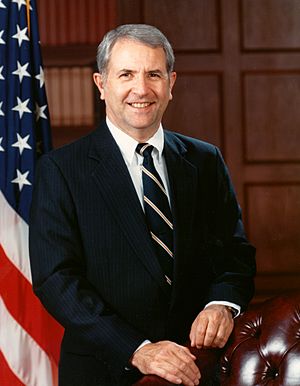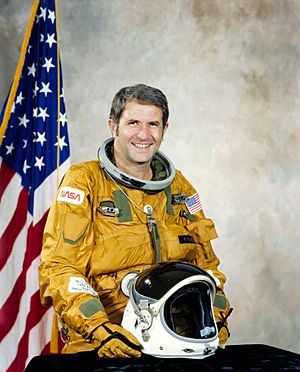Richard H. Truly facts for kids
Richard Harrison Truly (born November 12, 1937 – died February 27, 2024) was an important figure in American space exploration. He was a vice admiral in the United States Navy, a fighter pilot, an engineer, and an astronaut. He made history as the eighth administrator of the National Aeronautics and Space Administration from 1989 to 1992. He was also the first former astronaut to lead NASA.
After leaving NASA, he led the Georgia Tech Research Institute from 1992 to 1997. Later, he directed the National Renewable Energy Laboratory from 1997 to 2005.
Quick facts for kids
Richard Truly
|
|
|---|---|
 |
|
| 8th Administrator of the National Aeronautics and Space Administration | |
| In office July 1, 1989 – March 31, 1992 |
|
| President | George H. W. Bush |
| Preceded by | James C. Fletcher |
| Succeeded by | Daniel S. Goldin |
| Personal details | |
| Born |
Richard Harrison Truly
November 12, 1937 Fayette, Mississippi, U.S. |
| Died | February 27, 2024 (aged 86) |
| Education | Georgia Institute of Technology (BS) |
| Military service | |
| Allegiance | |
| Branch/service | |
| Years of service | 1959–1989 |
| Rank | Vice Admiral |
| Commands | Fighter Squadron 33 |
| Awards | Legion of Merit Defense Superior Service Medal Distinguished Flying Cross NASA Distinguished Service Medal |
| Astronaut career | |

Truly in October 1979
|
|
| Space career | |
| NASA astronaut | |
|
Time in space
|
8d 7h 21m |
| Selection | USAF MOL Group 1 (1965) NASA Group 7 (1969) |
| Missions | ALT STS-2 STS-8 |
|
Mission insignia
|
|
| Retirement | May 1992 |
Contents
Early Life and Education
Richard Truly was born on November 12, 1937, in Fayette, Mississippi. He went to school in Fayette and Meridian, Mississippi. In 1959, he earned a degree in aeronautical engineering from the Georgia Institute of Technology.
Truly was also an Eagle Scout, which is the highest rank in the Boy Scouts of America.
After college, Truly joined the U.S. Navy through a special training program. He became a naval aviator, or Navy pilot, on October 7, 1960. His first job was flying F-8 Crusader fighter jets with Fighter Squadron 33 (VF-33). He flew from aircraft carriers like the USS Intrepid and USS Enterprise. He completed over 300 landings on aircraft carriers, which is a very difficult skill.
From 1963 to 1965, Truly trained at the U.S. Air Force Test Pilot School in California. He later became an instructor there.
NASA Career
In 1965, Richard Truly was chosen to be one of the first military astronauts for the U.S. Air Force's Manned Orbiting Laboratory (MOL) program. This program was designed to put a military space station in orbit.
When the MOL program ended in 1969, Truly joined NASA Astronaut Group 7 at NASA. At NASA, he helped support other astronauts during missions. He also worked as a capsule communicator (CAPCOM), which means he was the main person who talked to astronauts in space from mission control. He did this for all three Skylab missions in 1973 and the Apollo–Soyuz mission in 1975.
Space Shuttle Flights
Truly flew twice on the Space Shuttle Enterprise in 1977 for its Approach and Landing Tests. These tests helped NASA learn how to land the Space Shuttle safely.
He then flew into space on the STS-2 mission in 1981. On this flight, he became the first person to be launched into space on his birthday! Truly later commanded the STS-8 mission in 1983.
After STS-8, Truly left NASA for a short time to become the first commander of the Naval Space Command.
Leading NASA After the Challenger Disaster
Three weeks after the terrible Space Shuttle Challenger disaster in 1986, Richard Truly returned to NASA. He became NASA's Associate Administrator for Space Flight. His most important job was to help the Space Shuttle program get back to flying safely.
He also had to decide if the Challenger would be replaced and what role the Shuttle would play in future space missions. It took a lot of hard work, but Truly and NASA's "Return to Flight" program succeeded. After 31 months, the Space Shuttle Discovery successfully flew on September 29, 1988, on the STS-26 mission.
Becoming NASA Administrator
Truly retired from the Navy as a vice admiral and was then chosen to lead NASA as its eighth administrator in May 1989. He was the first astronaut ever to hold this top position. He stayed in this role until May 1992.
One famous story from his time as Administrator involves the Voyager 1 spacecraft. Truly helped make sure that Voyager 1 took one last picture of Earth before leaving our solar system. This famous photo is known as the Pale Blue Dot.
Truly left his role as Administrator in February 1992. This decision was made because of different ideas about NASA's future. Some people wanted NASA to focus on smaller, faster missions, while Truly believed in larger projects like extending the life of the Space Shuttle.
Life After NASA
After leaving NASA, Truly became the Vice President and Director of the Georgia Tech Research Institute in Atlanta, Georgia. He worked there from 1992 to 1997.
From 1997 to 2005, he served as the director of the Department of Energy's National Renewable Energy Laboratory. This lab focuses on clean energy.
In 2007, Richard Truly spoke to the U.S. Senate Committee on Foreign Relations. He was part of a group of military experts discussing how climate change could affect U.S. national security.
Personal Life
Richard Truly was married to Colleen "Cody" Hanner, and they had three children. He passed away on February 27, 2024.
Awards and Honors
Richard Truly received many important awards and honors for his service and achievements. These include:
- Legion of Merit
- Defense Superior Service Medal
- Distinguished Flying Cross
- NASA Distinguished Service Medal
- Presidential Citizens Medal
- Collier Trophy (for his role in helping NASA return to spaceflight after the Challenger disaster)
- General Thomas D. White USAF Space Trophy
In 1995, he was honored by being inducted into the Georgia Aviation Hall of Fame.
Images for kids
See also
 In Spanish: Richard H. Truly para niños
In Spanish: Richard H. Truly para niños
- List of Eagle Scouts


